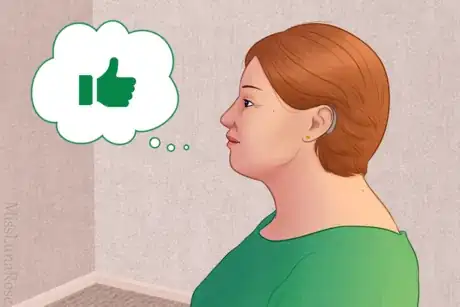This article was co-authored by Moshe Ratson, MFT, PCC. Moshe Ratson is the Executive Director of spiral2grow Marriage & Family Therapy, a coaching and therapy clinic in New York City. Moshe is an International Coach Federation accredited Professional Certified Coach (PCC). He received his MS in Marriage and Family Therapy from Iona College. Moshe is a clinical member of the American Association of Marriage and Family Therapy (AAMFT), and a member of the International Coach Federation (ICF).
There are 12 references cited in this article, which can be found at the bottom of the page.
This article has been viewed 22,858 times.
Do compliments make you cringe? Do you hate it when people praise you? How people react to praise is often a reflection of their self-esteem. Those with low self-esteem dislike hearing compliments because they contradict their own feelings of self-worth.[1] If you have low self-esteem but want to take a compliment, work on letting the compliment stand, accepting it graciously, and boosting your self-esteem.
Steps
Keeping Perspective
-
1Assume that the compliment is sincere. Compliments are jarring for people with low self-esteem because they clash with deeply held personal beliefs. If you feel that you’re unattractive and stupid, a compliment about your looks or intelligence will automatically seem insincere. Recognize that this thinking is flawed, first of all.[2]
- Try to give your peers the benefit of the doubt. Resist the urge to assume that a compliment is ignorant, malicious, or angling for something.
- Reverse your way of thinking. Instead of questioning why someone would ever give you a compliment, try to think of why they would want to trick, taunt, or manipulate you. There usually isn’t a good reason.
- Consider who is giving the compliment if you know them. If you know this person to be a sincere, good-natured person, then it is unlikely that they have malicious intent with their compliment.
-
2Resist the urge to hedge or deny. Your initial reaction on hearing a compliment might be something along the lines of “This is a joke, right?” or “Is this guy serious?” The problem with low self-esteem is that you yourself don’t believe the compliment. To accept one, then, you need to outwardly suppress this reaction.
- Avoid denying the compliment by saying something like “That’s not really true,” “No, I’m not,” or “You’d know better if you knew me.” People may interpret this sort of reaction as a personal rejection.[3]
- Try also to avoid hedging comments that downplay the compliment, like saying, “It’s nothing” or “It’s really not a big deal.” Expressing your disbelief too openly may be rude, as well: “Yeah right.”
- Let the compliment stand and settle in. You don’t have to say anything. If you absolutely can’t stay silent, say something neutral or in question form as, for instance, “Oh, do you really think so?”
Tip: When people give compliments, it's usually because they are choosing to appreciate you or something about you. If you reject the compliment, they may feel a little rejected too. Accepting the compliment affirms their judgment and your positive relationship with them. It's the politest and kindest thing to do.
Advertisement -
3Challenge your inner critic. Part of letting a compliment stand is to confront and quiet your inner-critic, at least for the moment. You may notice that voice in your head whenever you get a compliment, undermining what’s been said. The thing is, your inner critic is too harsh, generalizes, and can be illogical. Challenge this voice.[4] [5]
- Try to acknowledge your strengths.[6] For instance, try to replace “Sam complimented me on my presentation. Why? It was terrible!” with “Sam liked my presentation. I don’t feel great about it, but maybe I got some things right!”
- Notice when your inner critic makes illogical leaps, such as “Alex complimented my shirt and smiled – she must be laughing at me behind my back.” Think instead, “OK, Alex smiled. People usually smile when they’re being friendly. Maybe she meant it.”
Accepting the Compliment Graciously
-
1Accept the compliment with the “magic words.” You should try to be gracious when accepting a compliment, even if you don’t feel comfortable or totally believe it. Go through the usual formalities. This starts with a verbal acknowledgement. In other words, say “thank you.”[7]
- In most situations, a simple “thank you” or “thanks” is enough to politely accept a compliment.
- However, you can also build on a simple thank you with something like “Thank you, I appreciate the compliment,” “Thanks, that’s very kind of you to say,” or “Thank you, I’m glad you liked it.”
-
2Confirm the compliment with friendly non-verbal cues. There are other ways apart from just saying thank you to express your acceptance of a compliment. Body language in some ways shows what you are feeling more directly and more immediately than language. Make sure that you always receive compliments with polite non-verbal cues.[8]
- Use open body language. Keep friendly eye contact, for example. Lean toward the complimenter slightly and try to smile and keep an interested facial expression.
- Avoid distant or hostile body language. Try not to cross your arms, lean back, or turn your body away from the speaker.
- Watch your facial expression. A frown or look of annoyance will signal that you are not eager to accept the compliment. You should also not roll your eyes.
-
3Fight the urge to deflect attention. Expect to feel uncomfortable at first when accepting compliments. Wanting to disown the comment or deflect attention away from yourself is natural. However, it’s not gracious and perhaps even rude to give in to this urge. Resist it and try to embrace the compliment.[9]
- As said before, don’t deny, belittle, or refuse to recognize the compliment. This sort of behavior will seem rude.
- Don’t be tempted to deflect attention away from yourself, either. This can include complimenting the complimenter or lessening your own role, like saying “Well, I guess, but Bob worked even harder!” or “I’m glad you like my hair, but it’s all the stylist.”
Boosting Your Self-Esteem
-
1Identify your positive traits.[10] It’s hard but possible to boost your self-esteem going forward, so that things like accepting compliments will come more easily. Don’t give up! One of the most important steps is to give yourself a solid foundation. Everyone has strengths and positive qualities – it’s only a matter of discovering what yours are.[11]
- Consider writing a list of your personal qualities. What do you do well? What are your talents? What are your special accomplishments? Think very hard and come up with as many as you can.
- Remind yourself of these traits everyday. If it helps, put your list where you can check it when feeling doubtful. You might tack it to your bulletin board or bathroom mirror, for example.
- You might also consider keeping a journal and recording the good things that happen to you each day. Highlight five or ten positives each day – things you accomplished, did well, or felt good about.
-
2Forgive yourself. People who have low self-esteem often have trouble with all-or-nothing thinking. When something goes wrong, it’s not just a mistake but a complete personal failure on their part. There is no middle ground. This really isn’t fair to you, though. Learn to forgive yourself.[12]
- When you make a mistake, remind yourself that it was one mistake at one moment in time. Try saying, “It's normal to mess up sometimes. A mistake doesn't make me a bad person.”
- Focus on your effort rather than perfection, too. Remove the words “should” or “must” from your thinking and you’ll be able to set more realistic expectations – ones that you can meet.
- In the same vein, try to avoid mistaking feelings for facts. You are not stupid or unattractive or a failure just because you feel that way. We all doubt ourselves from time to time and no one is perfect.
-
3Focus on things that you can control. Try to replace any all-or-nothing thinking with reasonable expectations. Partly this means accepting that you can change and control some things in life and not others. It also means focusing on the things that you can control. Why should we feel badly when we fail to do the impossible?[13]
- If you’re unhappy about something you can change, like your poor math skills, start today to fix and improve it. Give yourself credit when you see a change.
- If you’re unhappy with something that you can’t change, like the size of your ears, work on accepting it. There’s no good reason to worry about these sorts of things. They will only make you frustrated and unhappy.
-
4Shift to neutral thinking if you're having trouble thinking positively about yourself. Sometimes believing positive thoughts about yourself is hard if you're used to believing only negatives.[14] Try working on seeing yourself as a normal, average person.
- "It's normal to make mistakes from time to time. I can work on fixing it."
- "I'm not a perfect dad, but I'm an OK one."
- "I'm a regular person."
- "That's one of my weak points. I have both strengths and weaknesses, just like everyone else."
- "Lots of people struggle with public speaking. I'm not alone in that."
- "I can't always be a perfect friend, but I can be a decent one."
- "Nobody deserves to be mistreated. I'm a normal human being, and I deserve to be treated decently."
-
5Practice self-compassion.[15] Practicing self-compassion can help to boost your self-esteem and it may also make it easier to accept compliments. Try to work on building your self-compassion whenever you have a chance to do so.
- Try to remember to be COAL. COAL stands for curious, open, accepting, and loving.[16] By adopting this attitude towards yourself, you may find it easier to practice self-compassion. If you find yourself beating yourself up over something, then remind yourself to be COAL.
- Imagine how you might treat a friend. Whenever you are feeling upset with yourself or just upset in general, try to imagine how you might treat a friend who was going through the same thing.[17] Would you berate your friend, or pat him or her on the back? Would you mock your friend, or provide encouraging words? Try to treat yourself as you would treat a friend who was dealing with the same problem.
- Acknowledge your needs. Another important part of practicing self-compassion is acknowledging your needs and giving yourself a break now and then.[18] If you are feeling overwhelmed or stressed, allow yourself to step away from what you are doing and do something relaxing for a while, such as taking a walk, reading a book, or just relaxing in a comfortable chair.
-
6Spend time with people who help you feel good about yourself and life in general. Notice which people lift you up and help you feel positive. Try reaching out to them and spending more time together. Tell them that you appreciate them and make time to hang out together. These people are positive influences and people worth keeping in your life.
- Practice giving and receiving compliments in a positive environment.
- Limit or cut contact with people who drag you down.
Expert Q&A
-
QuestionWhat is a positive way I can deal with low self-esteem?
 Moshe Ratson, MFT, PCCMoshe Ratson is the Executive Director of spiral2grow Marriage & Family Therapy, a coaching and therapy clinic in New York City. Moshe is an International Coach Federation accredited Professional Certified Coach (PCC). He received his MS in Marriage and Family Therapy from Iona College. Moshe is a clinical member of the American Association of Marriage and Family Therapy (AAMFT), and a member of the International Coach Federation (ICF).
Moshe Ratson, MFT, PCCMoshe Ratson is the Executive Director of spiral2grow Marriage & Family Therapy, a coaching and therapy clinic in New York City. Moshe is an International Coach Federation accredited Professional Certified Coach (PCC). He received his MS in Marriage and Family Therapy from Iona College. Moshe is a clinical member of the American Association of Marriage and Family Therapy (AAMFT), and a member of the International Coach Federation (ICF).
Marriage & Family Therapist It can help to look at and recognize the positive aspects of your life and what you really love about yourself.
It can help to look at and recognize the positive aspects of your life and what you really love about yourself. -
QuestionHow can I be nicer to myself?
 Moshe Ratson, MFT, PCCMoshe Ratson is the Executive Director of spiral2grow Marriage & Family Therapy, a coaching and therapy clinic in New York City. Moshe is an International Coach Federation accredited Professional Certified Coach (PCC). He received his MS in Marriage and Family Therapy from Iona College. Moshe is a clinical member of the American Association of Marriage and Family Therapy (AAMFT), and a member of the International Coach Federation (ICF).
Moshe Ratson, MFT, PCCMoshe Ratson is the Executive Director of spiral2grow Marriage & Family Therapy, a coaching and therapy clinic in New York City. Moshe is an International Coach Federation accredited Professional Certified Coach (PCC). He received his MS in Marriage and Family Therapy from Iona College. Moshe is a clinical member of the American Association of Marriage and Family Therapy (AAMFT), and a member of the International Coach Federation (ICF).
Marriage & Family Therapist Show yourself compassion because you deserve it. Also, identify your positive traits and play to them.
Show yourself compassion because you deserve it. Also, identify your positive traits and play to them.
References
- ↑ https://www.psychologytoday.com/blog/the-squeaky-wheel/201308/why-some-people-hate-receiving-compliments
- ↑ https://www.psychologytoday.com/blog/the-squeaky-wheel/201308/why-some-people-hate-receiving-compliments
- ↑ https://www.psychologytoday.com/blog/the-image-professor/201103/how-receive-compliment
- ↑ https://cmhc.utexas.edu/selfesteem.html
- ↑ http://kidshealth.org/en/teens/self-esteem.html
- ↑ Moshe Ratson, MFT, PCC. Marriage & Family Therapist. Expert Interview. 7 August 2019.
- ↑ https://www.psychologytoday.com/blog/the-image-professor/201103/how-receive-compliment
- ↑ https://www.psychologytoday.com/blog/the-image-professor/201103/how-receive-compliment
- ↑ https://www.psychologytoday.com/blog/the-image-professor/201103/how-receive-compliment
- ↑ Moshe Ratson, MFT, PCC. Marriage & Family Therapist. Expert Interview. 7 August 2019.
- ↑ http://www.mayoclinic.org/healthy-lifestyle/adult-health/in-depth/self-esteem/art-20045374?pg=1
- ↑ http://www.mayoclinic.org/healthy-lifestyle/adult-health/in-depth/self-esteem/art-20045374?pg=1
- ↑ http://kidshealth.org/en/teens/self-esteem.html
- ↑ https://misslunarose.home.blog/2020/02/04/parent-blame/
- ↑ Moshe Ratson, MFT, PCC. Marriage & Family Therapist. Expert Interview. 7 August 2019.
- ↑ http://www.psychalive.org/self-worth/
- ↑ http://self-compassion.org/exercise-1-treat-friend/
- ↑ http://self-compassion.org/exercise-8-taking-care-caregiver/







































































